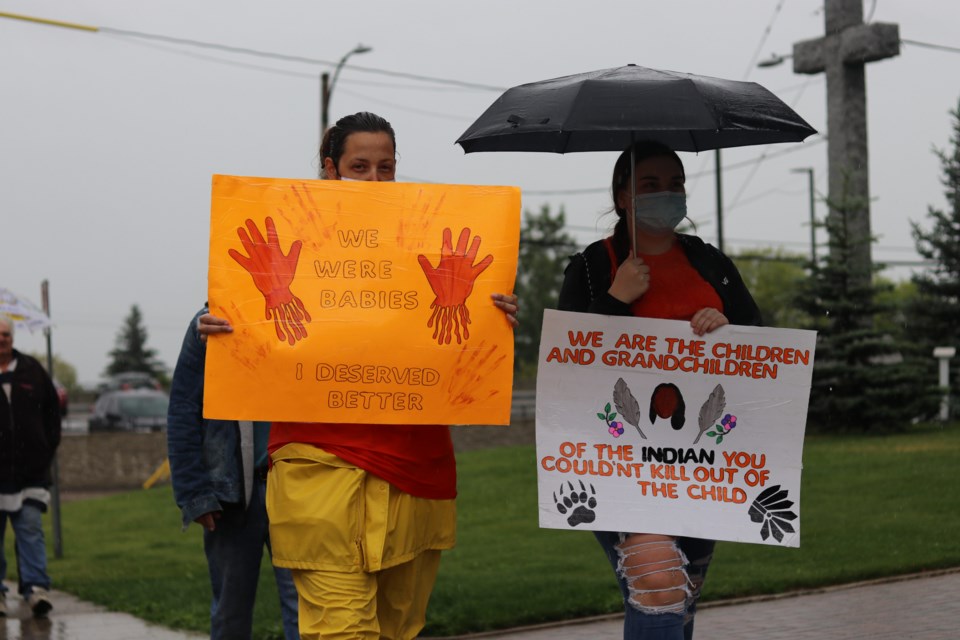The pouring rain didn’t stop a small group of protesters to gather outside of St. Anthony of Padua Cathedral Sunday morning to raise awareness about residential schools and the long-lasting impact the churches have left on Indigenous peoples.
Temagami First Nation member Krysta Madden-Broughton, 19, was the organizer of the protest.
Since the news about the 215 children whose remains were found at the former residential school in Kamloops, B.C., came out, Madden-Broughton said she wondered what she could do to help the community.
She went to a Catholic school herself. Now that she knows about what happened at residential schools, she feels like she betrayed her culture, she said.
“I want to hold individuals accountable for what happened to the children within the residential schools. And I want to show the residential school survivors and the children that were murdered that we acknowledge their stories and the pain they went through,” she said. “As a community, we will continue to fight for justice so that this never happens to another family.”
SEE RELATED: 'We were innocent children ... separated by force from our homes'
At least a dozen of people were on hand at the demonstration. Some drivers honked in support as protesters marched up and down the street. From time to time, they would stop and share their thoughts and feelings between themselves.
Cindy Fernandez said she attended the protest to spread the word about the Indigenous children who died at residential schools and to look for answers.
“We want healing to begin, and you can’t do that without recognition,” she said. “It’s not an attack on one individual church. We want this to go higher. We hope these priests will contact their superiors and ask for answers. We’re actually looking to them for support, not trying to be a nuisance to them.”
One person laid some tobacco in front of the church as an offering and to acknowledge the missing children. The protesters also did smudging.
Sarah McKeachnie, who participated with her seven-year-old Marcel Gravel, brought three pairs of shoes and placed them by the cathedral’s staircase.
“We’re here to protest because we want to know why the children were buried and killed,” Gravel said.
McKeachnie said her son is Métis and it's important he's aware that there were children, some of whom were younger than him, who went missing or died.
“We want accountability. They have the power to talk to the higher-ups and get these records and get the answers,” she said. “That’s what we want: recognition and answers.”
SEE RELATED: Chief cautions careful approach to residential school burial site investigation
SEE RELATED: People need to learn, truly understand Canada's 'true history'
Two police officers, who parked nearby, stepped out of their cars and watched when the protesters started chanting as parishioners were leaving the church after the first mass.
The demonstrators stood in a line in front of the church holding handmade signs and chanting, “No pride in genocide,” “They were children, we want answers,” “Where are the children buried?”
Before the second mass, one of the parishioners, Gordon King, who was heading to the church stopped by to express his support to the group and to thank them for bringing attention to the “crimes that have happened in the past.”
“What happened in the past affects everything that is happening today,” King said in an interview. “It’s not just people at these schools who were damaged, all of Canada was damaged. Till we recognize that, reconcile and find ways of rebuilding the society that recognizes Indigenous people as founding people, we’re not going to be able to move forward.”
Matachewan First Nation member Lillian Langlais said the Catholic church should be paying to identify and investigate burial sites on the grounds of former residential schools, not the government.
“It shouldn’t be the taxpayers that are paying for this. It should be the church,” she said.
Madden-Broughton said they’re planning to hold a peaceful protest in front of a new church every Sunday.
“I’m going to roll with how it goes. I hope it goes smoothly, I’m just there to peacefully protest. I don’t want any kind of verbal or physical violence going on,” she said. “I’m hoping as the community we can come together and help those who are suffering through this time.”
A 24-hour residential school crisis line, established to provide support to former students and their families, is available at 1-866-925-4419.



